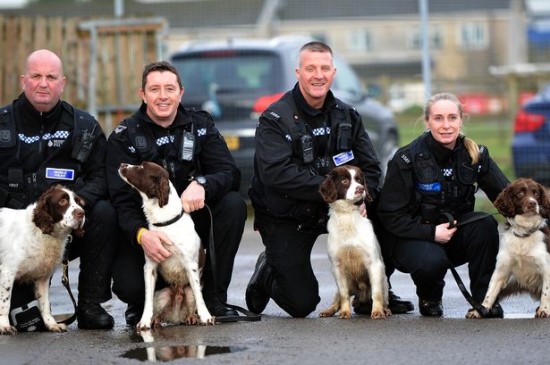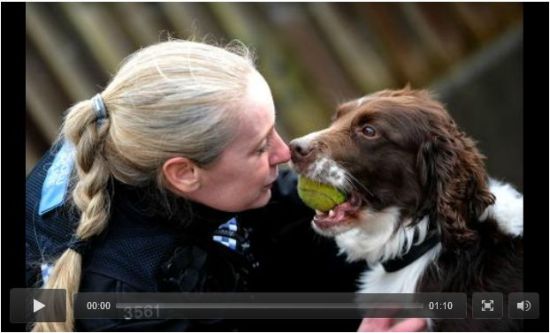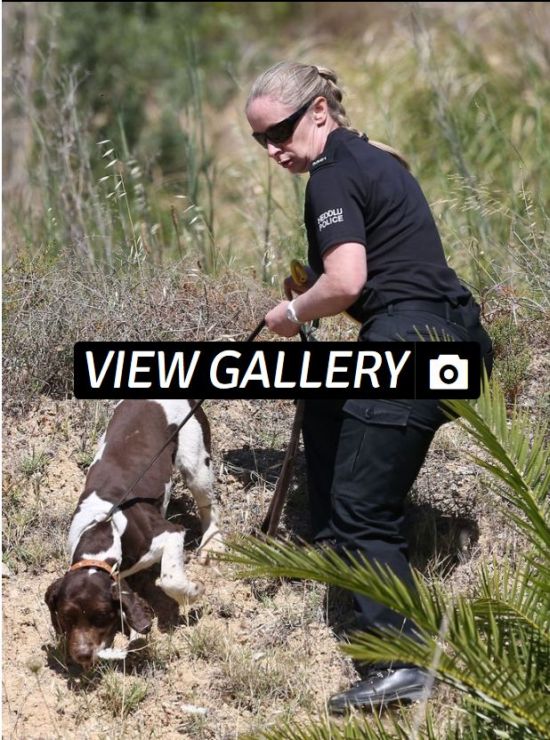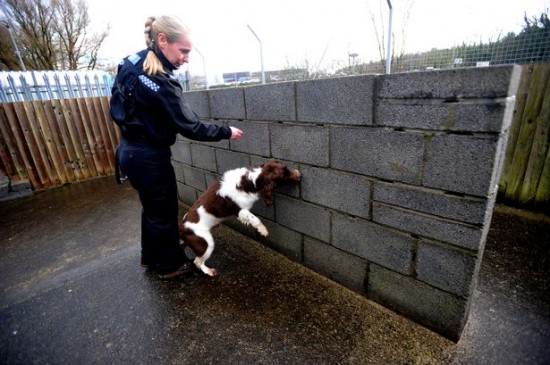|
|
| |
|
The four dogs have been involved in
searches for April Jones and Madeleine
McCann |
 |
| From
left, Pc Michael Newman and
Badger, Sgt Andrew Patterson
and Spud, Pc David Brake and
Muzzy, and Pc Sally Richards
and Tito. |
|
|
Meet Badger, Spud, Muzzy and Tito -
highly trained specialists and crime
fighters.
The quartet have what from the outside
seems like a grisly job - searching for
evidence in rape and missing people
investigations and for body parts.
But their handlers, PCs Michael Newman,
David Brake, Sally Richards and Sgt
Andrew Patterson say it is a vital job
bringing closure to families in their
darkest hour.
The team, from South Wales Police, has
been involved in the majority of the
recent murder and missing person cases
in Wales but their longest operation to
date has been the search for Machynlleth
school girl, April Jones.
They spent six months, on and off in mid
Wales, trawling woodland around Ceinws.
It was both physically and emotionally
draining for the officers and the dogs.
PC Newman said: “It was long hours in
arduous conditions. The dogs were given
special food and drinks to increase
their energy and drive. Just like us
they became tired.”
“That operation, along with many others,
was also hard on the officers. |
| |
Watch a police crime scene
dog recover a human tooth
Clink link above to view
video |
 |
|
|
|
|
“But with missing people and murder
cases, we know we’re giving people
closure. You know that person or body
may not have been recovered if it wasn’t
for the work that the team put in. With
murder cases, it’s about finding
evidence that could otherwise have been
missed,” said Pc Newman.
Pc Williams said: “It’s a sense of
determination to get justice for the
family. All of us have a quiet sense of
determination. Sometimes you find
yourself up to your knees in mud, you
have been there for hours but what keeps
you going is finding or getting closure
for the family.”
As well as working on cases local to
their Bridgend base, they have also been
asked to go abroad. They have been
involved in the most recent search for
missing schoolgirl Madeleine McCann. |
|
|
In pictures: How Welsh
sniffer dogs searched for
Madeleine McCann:
To view gallery click on
link above |
 |
| |
|
|
All four of the team went to Portugal in
June last year, working with the
Metropolitan Police.
But what is it that makes these springer
spaniels so skilled? Partly, it’s
because their olfactory glands - in
their noses - are 400 times more
powerful than a human’s.
Pc Newman said: “The dogs are tasked
with looking for evidence which can be a
minuscule piece of evidence like a blood
drop which is pin-prick sized.”
That could be in a search area which is
small - for example a room in a house -
or miles and miles of land.
When the dogs find something of
interest, they are trained to freeze.
While other force dogs are tasked with
smelling explosives, drugs or firearms,
these dogs have a “scent spectrum” which
covers the changing conditions a body
can be found in over days, months or
years. |
| |
 |
|
PC Sally Richards and Tito
searching for a human tooth.
Part of Crime Scene and
Victim Recovery Dog Unit,
South Wales Police Dog
Section, Waterton Cross,
Bridgend. |
|
|
|
|
These four are all rescue dogs who came
from owners who couldn’t cope with their
high drive and endless energy, but it is
just which makes them perfect for police
work.
They initially have training which lasts
up to eight weeks, but from then on it
is constantly evolving.
The officers’ role is to use their own
training and experience but also
intelligence from other police teams to
guide the dogs.
Pc Newman explains: “We try and narrow
down the search area as best as we can,
using intelligence and field skills. As
handlers we’re looking at the
circumstances and information from
national databases and previous
experience to help narrow that down.”
The dogs live with their handlers, only
leaving their sides when the officers
have holidays.
The Victim Recovery and Crime Scene
Investigation Team are on call 24 hours
a day.
Pc Brake explains they couldn’t do the
job without their “supportive families”
but all four say they are honoured to be
part of an elite team.
And the dogs? “They come to work to
play, they have the best job a dog could
have,” says Sgt Patterson. |
|
 |
|



